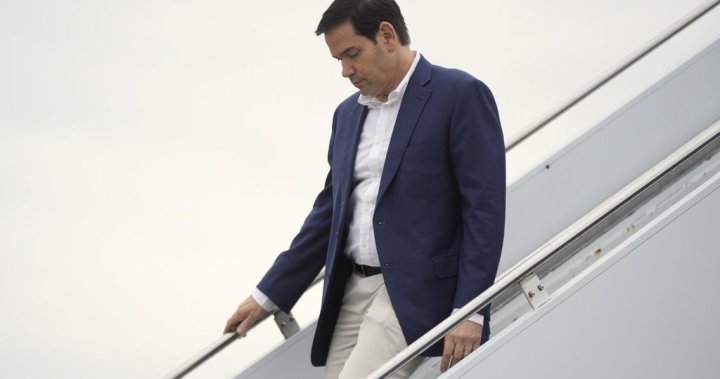Physical Address
304 North Cardinal St.
Dorchester Center, MA 02124
Physical Address
304 North Cardinal St.
Dorchester Center, MA 02124

The United States determines the presence of employees who are not considered important operations in the Middle East and their relatives due to the possibility of regional anxiety, the state department and military personnel said Wednesday.
The State Department announced that it had commissioned all non -essential staff leaving the US Embassy in Baghdad, based on the latest review and commitment to “maintain Americans safe at home and abroad”. The Embassy had already been limited staff and the order would not affect a large number of staff.
The department, however, also allows to depart from non -essential staff and family members from Bahrain and Kuwait. This gives them the opportunity to leave these countries at the expense of the government and through the government.
Defense Secretary Pete Hegsets “has allowed voluntary military -dependent departure from places” throughout the region, the US Central Command said in a statement. The team “monitors developing tension in the Middle East”.
Anna Kelly, a spokeswoman for the White House, confirmed the marches.
“The State Department regularly reviews American staff abroad, and this decision was made as a result of a recent review,” Kelly said.
Global News has asked Global Affairs Canada, or does it take the removal of similar Canadian diplomatic staff in the region.
Middle East Supreme US military officer Eric Kurilla was expected to testify on Thursday in the Senate Armed Service Committee, but this testimony has now been postponed, according to the Committee’s website. The Pentagon had no immediate comment on why Kurilla’s testimony was postponed.
In recent days, tensions in the region have increased as negotiations between the US and Iran on the rapidly developed nuclear program seems to have been encountered with a dead end. The aim of the negotiations is to limit Iran’s nuclear programs in exchange for the lifting of some alarming economic sanctions that the US has imposed on the Islamic Republic. Iran insists that its nuclear program is calm.
Following two US officials who spoke with anonymity, Oman was scheduled for the next round of talks – the sixth – this weekend was scheduled for an anonymous condition. However, these officials said Wednesday that the negotiations were unlikely.
President Donald Trump, who has previously said that Israel or the US could take air strikes on Iran’s nuclear weapons, if the talks failed, gave less than an optimistic opinion about an agreement with Iran, telling the New York Post “Pod One” Podcast that he is increasingly convincing.

To get news that affects Canada and worldwide, sign up to show the news that is delivered to you when they happen.
“They seem to be late and I think it’s a shame. Now I’m less sure than I would have been a couple of months ago. Something happened to them,” he said in an interview on Monday and released on Wednesday.
Iran’s mission to the UN in social media that “the threat of enormous forces will not change the facts”.
“Iran is not looking for nuclear weapons, and US militaryism only contributes to instability,” the Iranian mission wrote.
Iranian Defense Minister General Aziz Nasirzadeh told journalists on Wednesday that he was hoping to talk to the United States, although Tehran was ready to react.
“If we are conflicted, the opponent’s accidents will definitely be more than ours, and in that case America must leave the region, because all its bases are in our reach,” he said. “We have access to them, and we will target them all to the host countries without hesitation.”
Meanwhile, the Council of Heads of the International Nuclear Energy Agency was probably intended to vote for Iran’s distrust. This could launch an effort to recover the United Nations sanctions on Iran, through the event of Tehran’s 2015 nuclear unifying world powers, which is still active until October. Trump withdrew from this contract in his first term.
Earlier on Wednesday, a statement from the United Kingdom’s Maritime Trade Operations Center, in the British Naval Force, issued a warning to ships in the region that it was “aware of increased tensions in the region that could cause military activity to exacerbate directly affecting sailors.”
It encouraged caution in the Gulf of Persia, the Gulf of Oman and the Strait of Hormuz. It did not name Iran, although these waterways have seen Iranian ship cramps and attacks in the past.
Meanwhile, Iraqi state -owned news agency Iraqi agency in a statement that differed in an unnamed government official said the evacuation of some minor employees from the US Embassy in Baghdad is part of “procedures related to the diplomatic presence of the United States in many Middle East countries, not just Iraq.”
“We repeat that all security indicators and briefing support increasing stability assessments and restoration of internal security,” the statement said.
Gambrell reported from Dubai, the United Arab Emirates. AP writers Farnoush Amiri United Nations, Amer Madhani in Washington and Qasim Abdul-Zahra’s Baghdad’s investment in this report.
& Copy of 2025. The Canadian Press

